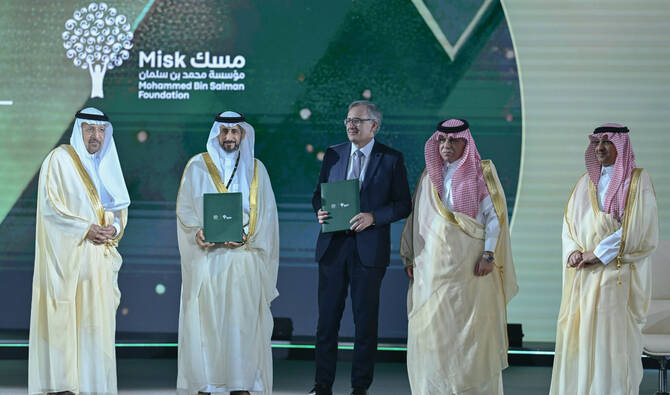Riyadh: Madinah’s art scene is expanding, featuring a rich blend of traditional and contemporary influences rooted in the Kingdom’s Islamic heritage, cultural identity and historical lineage.
“The art scene in Madinah is constantly evolving, leading artists in the city to keep pace with this development and enter the artistic landscape,” artist and Madinah native Meshal Al-Hujaili told Arab News.
Al-Hujaili described how the art scene in his home town influences his work: “Madinah, with its spiritual nature and simplicity, always leads me to pursue simplicity in my work, despite its artistic depth.”
Born and raised in Madinah, Al-Hujaili contributes to the growth of the local art scene through his solo art exhibitions and collaborations with the Madinah Art Center.
The center “has been a turning point for the art scene in Madinah,” he said.
“Due to its ongoing art sessions, exhibitions and meetings, it has increased my exposure to artists who preceded me in the field,” Al-Hujaili said.
“The center provides a stimulating environment for dialogue and exchange of experiences among artists, which has opened new horizons for me in my expression and in my understanding of the role of art in society,” he said.
Al-Hujaili’s artwork, currently on display in the main gallery of the Madinah Art Center, is a result of the Madinah International Symposium 2023.
“The painting, titled ‘Flow,’ reflects my experience at the symposium, my presence among more than 200 artists from around the world, and the artistic flow that prevailed at the center,” he said.
Al-Hujaili’s latest exhibition, titled “Path,” in collaboration with curator Nouf Al-Balawi explored “reflections, each representing a pivotal stage in the artist’s life as he searches for self.”
The art exhibition shed light on the Madinah native’s life, “documenting the events around him, about the various paths of life, in an individual experience that begins with the embryo and continues through to the impact he creates,” Al-Hujaili said.
When asked where he draws his inspiration from, the artist said his natural curiosity and love for asking questions.
Al-Hujaili’s latest exhibition is inspired by five themes, the first being “From Embryo to Embryo,” a series of four works that explore the circle of life, starting from the moment the fetus is formed in the womb and continuing through parenthood, “where the first fetus never ends, but rather transforms and begins anew as the father of a fetus,” as Al-Hujaili described it.
The second theme is titled “The Child I Was Not.”
“After highlighting the fetal stage, the exhibition moves to the next stage: childhood,” he said.
This is a single work in which the artist tries to reflect on children’s perspectives on art, because “art was not part of their experience as a child,” he said.
One part of the exhibition, titled “Morning Exercises,” shifts from childhood to decision-making and commitment. It features 30 artworks documenting the artist’s dedication to a daily morning art practice, lasting up to five hours of creating new pieces.
Another section titled “What to Do?” looks at the artist questioning the definition of the artwork and discovering where the value in the artwork lies.
In the concluding “Effort and Impact” section, two works represent the artist’s journey in producing art, his commitment to daily work, and his constant questioning and research.
Closing the interview, the artist emphasized how the Madinah Art Center supports his work and the work of other artists across the Kingdom: “The gallery encourages artists to explore new experiences and view the work of other artists,” he said.
“The center also offers numerous training courses and dialogue sessions that help artists become part of the artistic movement taking place in Madinah across various artistic fields,” he said.
When asked what he hopes to accomplish in the Madinah art scene, he said: “I have always dreamed of making a real impact on how people view art and representing the Kingdom of Saudi Arabia.”
Al-Hujaili said he hopes his work will be immortalized in history.



























